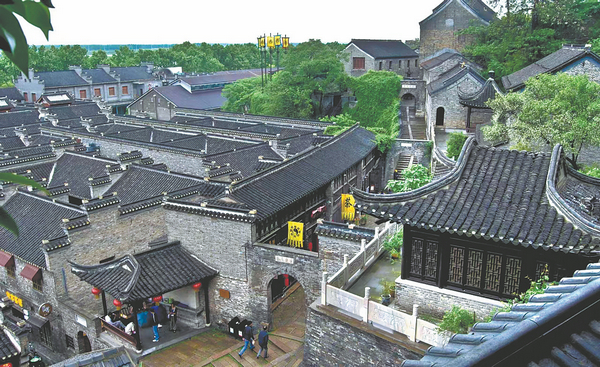Visitors hop onboard charming ancient ferry culture


Once a bustling hub on the Yangtze River, the Xijin ferry dock in Zhenjiang, Jiangsu province, has shaped the area's culture, architecture and folk customs.
Italian traveler Marco Polo is said to have disembarked there when he arrived in Zhenjiang from Yangzhou, another city in Jiangsu, in the Yuan Dynasty (1271-1368). Although the original ferry is gone now, its charm remains.
Today, after years of restoration, the area has become the Xijin ferry historical and cultural block. Here, visitors can immerse themselves in ancient ferry culture while enjoying various leisure activities.
Zhai Dezhi, general manager of Zhenjiang City Construction Industry Group, explains that the local government started renovating and protecting the entire area in the 1980s.
Now, the revamped neighborhood in the old city offers cultural displays, traditional markets, tourism attractions and creative spaces enjoyed by locals and travelers alike.
"We're focusing on blending culture and tourism to create a leisure hub that also invigorates the nighttime economy. We've crafted many unique Zhenjiang experiences," Zhai says.
"The area is buzzing. Some people say they love Zhenjiang even more because of the Xijin ferry."
During this year's Spring Festival holiday, the area welcomed 260,000 visitors, marking a 73 percent increase over 2023. More than 70 percent were from outside the city. And the district's overall tourism revenue reached around 8 million yuan ($1.1 million).
Zhai also points to plans for night tours of the ancient ferry area to nurture after-dark tourism through sightseeing, cultural experiences, dining and shopping.

The Xijin ferry historical and cultural block dates back 1,300 years to the Tang Dynasty (618-907). It's crucial for studying the history of China's transportation along the Yangtze River and the Grand Canal. The area boasts nearly 40 protected historical and cultural sites.
According to Wang Minsong, a member of Zhenjiang's cultural heritage protection expert group, the preservation of historical areas involves maintaining the authenticity of relics, the distinctive features of historical buildings, the integrity of spatial layouts and local lifestyles.
"Adhering to the principle of 'rescue first, protection as a priority', we've focused on restoring buildings in the Xijin ferry area," Wang explains.
"All the preserved buildings are in use. None are vacant."
liyingxue@chinadaily.com.cn

































